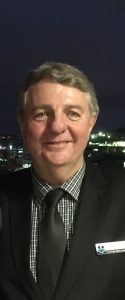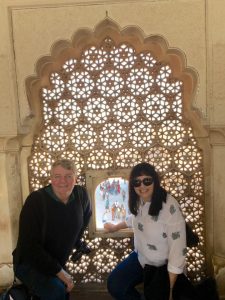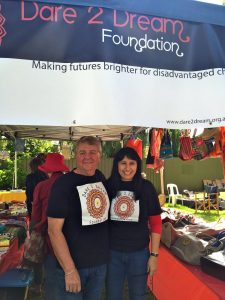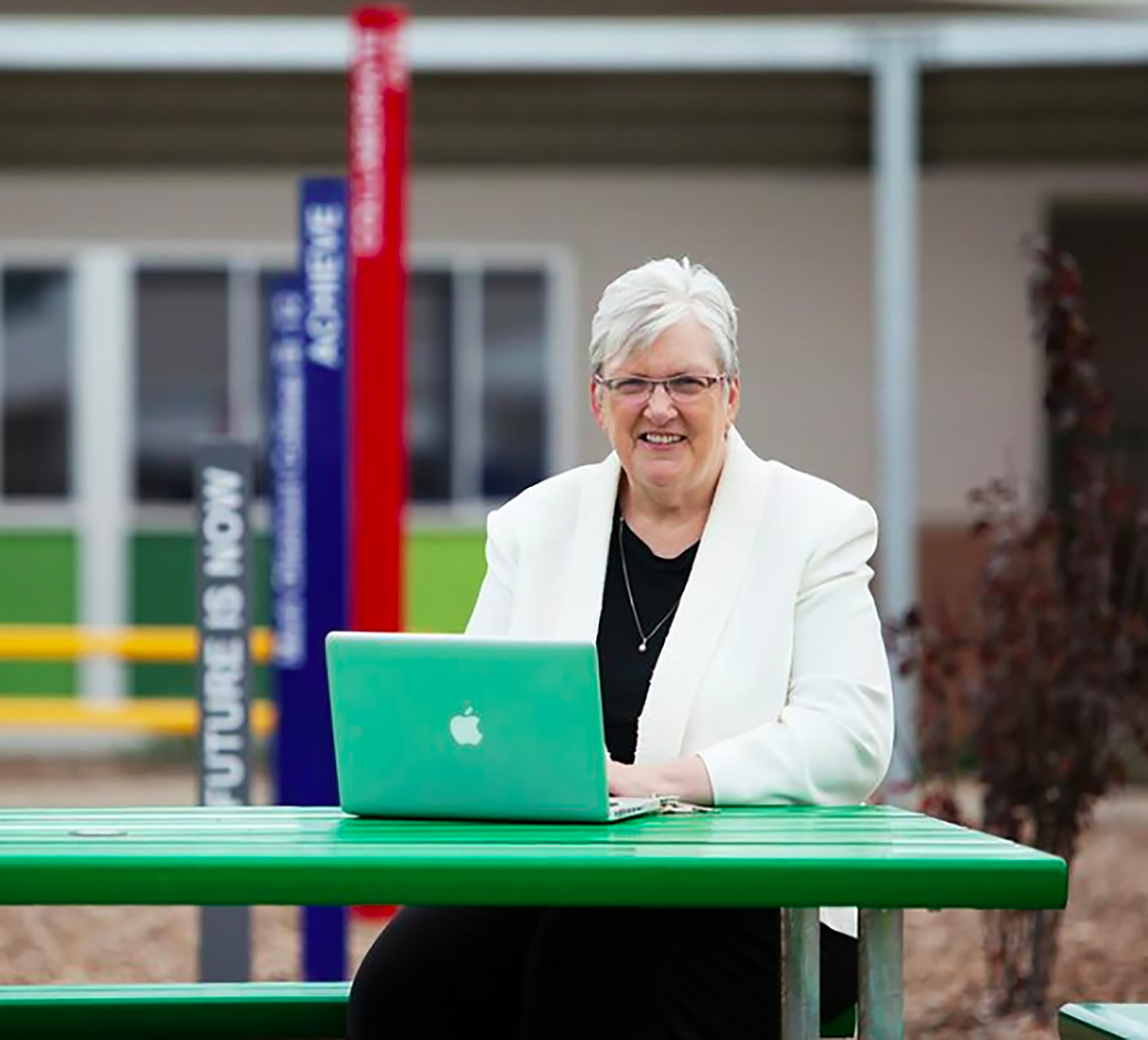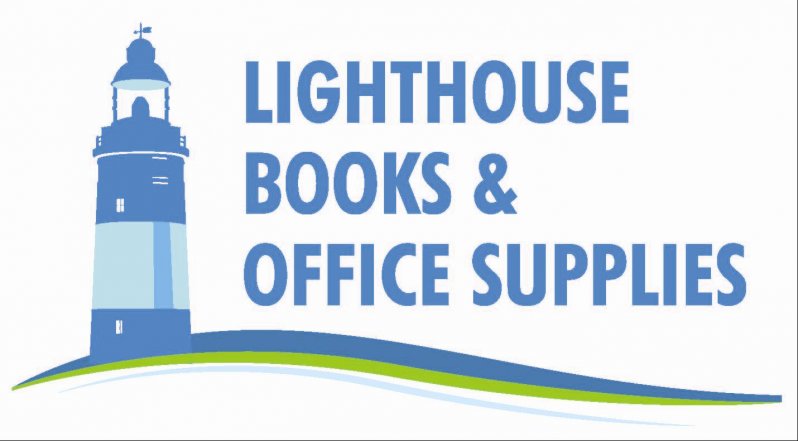
Rob Shepherd
30th September 2019
Rob Shepherd grew up at Balaklava. He came from a long-standing farming family in the local area. His older brother continued with the family’s farming tradition but Rob chose education.
Rob attended Balaklava PS, St Joseph’s Convent school, Blaklava HS and he completed Yr 12 in the city at Enfield HS. At the time, there was no Yr 12 at Balaklava HS. He went to Adelaide University where he studied both Arts and Science subjects and completed an honours degree in Geography (Town Planning and Urban Development). He reminisced that over his teaching career he taught a combination of Arts and Science subjects: Geography, Natural Resources Management, Biology English, History, Physical Education, and even handwriting to primary school students (Area School).Rob’s professional qualifications also include an M Ed and Grad Cert Ed Admin.
His first teaching appointment was at Orroroo Area School in 1977. He remembers that farming there was more marginal than at Balaklava. The school served a close-knit community with a strong Irish-Catholic background. He stayed at Orroroo for 6 years. With his own background, he knew about the dynamics of country life at first-hand. He became involved in the local Lions Club and he also coached kids. With this first appointment, he had his early lessons in the importance of community connection and the role of the principal in fostering such community connection. He was particularly impressed by one of his first principals – Colin Heath – who demonstrated strong skills in this area of community connectedness and emphasised such teaching basics as accountability in work programming. Rob realises now that the principal himself at the time was only a few years older than he was. It was a very close staff and life-long friendships were formed. Orroroo AS holds many great memories for him, including the writing of the school’s centenary history with his wife and Yr 9 students.
Rob shifted to Lameroo AS as a senior in 1983 but this only lasted a short time because family sickness required a shift back to city and in 1884 he was appointed to Dover HS. He stayed at Dover through the amalgamation with Secombe HS and the creation of Seaview HS in 1889. In fact, he stayed on at the amalgamated school until 2004, a period which represented 21 years of service, effectively in the one school. He served there as Senior, Campus Manager and both Assistant and Deputy Principal.
In 2004 Rob was appointed to Woodville HS as Deputy with Meredith Edwards as Principal. Then in 2008 he was appointed as the Principal at Le Fevre HS. He stayed a tLe Fevre for 11 years until he retired at the end of 2018.
Rob’s professional career was marked by extended periods in a relatively small number of schools. One consequence of this was that he was able to develop experience and expertise in particular educational areas. One such area was international education. He made the point that he probably stayed too long at Seaview HS, at least in terms of his own professional career, primarily because he was so committed to the school’s international education program.
When Seaview HS was created there was a strong international education focus and Rob exercised key leadership responsibilities in this are over a long period. He was closely involved in organising the program at Seaview HS and forging sister school relationships. He also taught English overseas. He was effectively ‘loaned ‘ by the Department to conduct short, intensive programs in locations in Japan, South Korea, Zimbabwe, Laos and even Mongolia. The Mongolian work was linked to Rio Tinto and the Australian Trade Commission in Ulan Baator. The immediate concern, particularly in relation to South Korea, was that students were exposed to American English yet their potential tertiary study pathway was more likely to be in Australia. Accordingly, an Australian accent and a keener sense of Australian language-use were both required. Rob made many such short-term educational trips and he regards his extensive experience in international education as one of his career highlights. Interestingly, when he was appointed as principal at Le Fevre he found another major international education focus, this time with the teaching of Indonesian. Not surprisingly he again committed his energy to the related school visits and exchanges. He emphasised how impressed he was by the quality – and scope – of the Indonesian teaching at Le Fevre. Moreover, he recalled how strong international links developed between Le Fevre and sister schools in Indonesia via the pursuit of the Middle Years IB program. As an extension of this professional relationship, Rob also found himself conducting short, intensive courses in Indonesia with teachers which covered the professional learning associated with the IB. Rob was also keenly involved with the international ed program at Woodville HS. All of this experience, across several schools, demonstrates the remarkable background in and commitment to international education which has been such a strong feature of his professional life.
Rob also spoke proudly of the work at Le Fevre in relation to vocational education and training. He acknowledged that he was fortunate to be in the right place at the right time when, in 2010, the then Premier (Rann) made Le Fevre a specialist maritime studies school for SA and promoted significant links with the various naval construction enterprises in the region. There had already been a strong emphasis on engineering at the school and the more specialist focus was a natural fit.
Concurrently, there was also a strong commitment amongst western suburbs high schools to set up regional training programs to serve all students across the entire region. Consequently, the maritime focus for Le Fevre coincided with the development of the Western Adelaide Secondary Schools Network which has proved very successful in providing training and pathways across the full range of industries. Rob noted that, more recently, the regional emphasis had been further strengthened by STEM and emphasised that both trade and academic strands were covered. He spoke very highly of the success of WASSN and was proud of the 10 years he chaired the organisation. He also noted that while many of the original principals across the Western Adelaide network have retired or moved on, including himself, the network itself had proved very stable and is still very strong. Equally, the maritime focus at Le Fevre has proved as durable and successful.
Another major achievement he is proud of was the introduction of the Middle Years program in the International Baccalaureate (IBMYP) at Le Fevre. Obviously the international focus appealed to him but, more importantly, he described how the successful introduction of the program raised the level of students’ confidence in their abilities and sense of self. He also noted that it had a similar positive effect on the parents and local community. He believed that the IB gave an excellent framework for everything that happened in the school, from academic focus to the promotion of core values and the underpinning commitment to quality assurance. He stated that he believed the IB professional learning program for staff was very well received and, objectively, of excellent value. He presented at a number of Asia Pacific meetings and conferences, in locations such as Singapore, Kuala Lumpur and New Caledonia.
Rob pointed out the significance of Le Fevre to the ’stolen generation’. Many such children found themselves at an Anglican home – St Francis House/ St Francis Boys Home – at Semaphore South and Le Fevre became their secondary school. The school has become a key institution in this history. Familiar names include Charles Perkins and Dr John Moriarty AM. Rob was proud of the school’s continuing work in the area of Aboriginal Education and he worked closely with such figures as Uncle Lewis O’Brien and Jack Buckskin to introduce Kaurna Language teaching to the school. Rob himself became a Kuarna speaker and, in his time as principal of Le Fevre, supported young Aboriginal students to deliver the Kuarna Welcome to Country at many formal functions across Adelaide.
When it came to reflections on the overall role of the principal, Rob was unequivocal. He stated how fulfilling he had found the role and described the principalship as the ‘best job ever’. He marvelled at the complex, multi-stranded nature of the role and the incredible sense of achievement that came when the principal managed to draw together all the competing challenges, and the opportunities, resources and, of course, all the various players and stake holders. There was no equivalent position that offered so many challenges, opportunities and, if you were prepared to pursue them, creative solutions to complex problems.
At the same time, he offered critical insights. For example, he made the point, strongly, that quality leadership is always based on skilled management. The essentials of school management, particularly in areas such as finance and HR, cannot be left to chance or simply assumed. He believed that high level skills and hands-on experience were essential. Equally, a quality and supportive leadership team is essential, for both (pedagogical) leadership and school management.
Rob had clear positions on change. Any change – either externally mandated or self-generated within the school – had to fit within the school’s holistic vision or sense of itself. Change that ‘jarred’ with the schools ethos, history or objectives would always lead to problematic outcomes. Equally, change was a very powerful motivator. When staff saw the need the change and the promise of improved outcomes, for both themselves as teachers and their students, it could generate very powerful support and commitment.
Specifically, in relation to the need to work with staff and ensure that they were behind the principal, Rob noted that It was not sufficient merely to be ‘approachable’ and ‘involve’ staff. Staff can never be taken-for-granted. Rather, the principal had to recognise that the professional experience and judgement of the staff were both extremely powerful in their own right and also critical to the success of any school undertaking. If the principal was unable to convince the staff of a particular stand, belief or direction then, again, outcomes would always be compromised. As much confidence as the principal might have in their own position, beliefs and competence, they needed to accept that the staff were always observing and judging them – on the quality of their ideas, the value and form of their leadership, their ability to scope likely outcomes etc. For Rob, the principal’s effectiveness as the school leader always relied on the confidence and support they could draw from their staff. There are equally complex relationships between the principal and the student body and parents. Rob also made the point that schools inevitably change with the principal, for better or worse.
As confident as he was in the inherent power of the principalship, Rob was also realistic about the demands of the position. In fact, he noted that he did not really mind coming to the position of principal later in his career because he judged that the demands on his family when he was younger would have been excessive. He also noted the importance of life outside school, the need for other interests and the ability to’ turn off’.
In terms of looking back over the past 40+ years of education, Rob argued that digital technologies had had a profound effect on schools and education, for both good and bad. He thought that the potential of AI would be equally significant. He also believed that the ‘internationalisation ‘ of education had been very significant in a positive sense. It was particularly important in the context of Australian schooling. He also noted the way the overall perception of education had shifted from the idea of a fixed set of discrete ‘bodies of knowledge’ towards a dynamic set of transferable skills, competencies, capabilities and dispositions. Education had become far more holistic.
Rob was positive about the mentoring programs offered by the Department to beginning principals and indicated that he was keen to be involved. He complimented the Department on what he saw as its more recent moves to promote longer-term planning and vision. He was also very positive about the various District Directors with whom he had worked.
In his retirement Rob works closely with his wife – Rita Shepherd – who is the President of Dare 2 Dream Foundation which is a SA registered charity whose vision … is to make the dreams of a better future become a reality for disadvantaged children and adults. It works with … underprivileged communities in the developing world and in Australia. Currently it supports several major programs based in the Indian city of Nagpur. The projects include initiatives to protect street children and homeless children and young people from abuse, violence and exploitation. There is a strong focus on empowering women and adolescent girls, including the provision of vocational training and micr-economics projects. Rob’s wife was recently awarded the Order of Australia medal for her work, from 2009, in the foundation. Rob feels that the skill set he acquired as a secondary principal has proved invaluable in his work in the foundation and, obviously, there is a close fit with his abiding commitment to international education and the belief in the power of education – and training – to transform people’s lives. He averages one month year working in India.
- Rob and Rita Shepherd (India)
- Dare 2 Dream Foundation

